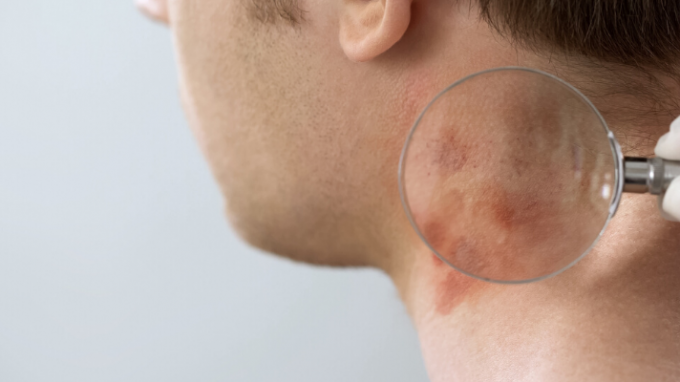What Is the Relationship Between Male Fertility and Psoriasis?
Psoriasis decreases male fertility by mediating systemic inflammation that affects the hormone profile and synthesis and the sexual accessory gland.
Untreated psoriasis can lead to infertility as one of its many complications. Other common complications include diabetes, nonalcoholic fatty liver disease, metabolic syndromes and cardiovascular diseases. Psoriasis is an autoimmune condition inflammatory in nature that manifests as thick and shiny scales on the affected skin. The condition affects the skin of any region of the body, including the genital region. The cytokine TNF-α is involved in the pathogenesis of psoriasis and the synthesis of sperm; because of this, it is suspected to influence male infertility and the inflammation process.
Inflammatory Mediators
Studies indicate the relationship between male fertility and inflammation mechanisms by registering an increase of the TNF-α level in semen that is consistent with infectious or inflammatory conditions. TNF-α is synthesized by the germ cells that regulate spermatogenesis in males, and its concentrations are typically low. High concentrations of TNF-α promote male infertility because such a condition interferes with the genomic integrity of synthesized spermatozoa in the testes.
Furthermore, inflammation is known to trigger hypogonadism in men and significantly decrease serum concentrations of testosterone. The drop in testosterone levels occurs due to the inhibition of the Leydig cells by psoriasis mediated inflammation. Apart from TNF-α, interleukin-6 and interleukin-1 are known pro-inflammatory mediators found in high concentrations in psoriasis patients, and they inhibit the reproductive axis. These cytokines target and alter the hypothalamic-pituitary-gonadal axis involved in the synthesis and regulation of sex hormones.
Alteration of the Hormonal Profile
 Psoriasis patients demonstrate elevated serum concentrations of estradiol and lower testosterone levels than those who are healthy. The autoimmune condition, psoriasis, alters the sex hormone profile for men, predisposing them to infertility. Sex hormone-binding globulin (SHBG) is a protein that binds to the hormones testosterone and estradiol. SHBG levels in psoriasis patients drop significantly, indicating a compensation mechanism consistent with secondary hypogonadism in men.
Psoriasis patients demonstrate elevated serum concentrations of estradiol and lower testosterone levels than those who are healthy. The autoimmune condition, psoriasis, alters the sex hormone profile for men, predisposing them to infertility. Sex hormone-binding globulin (SHBG) is a protein that binds to the hormones testosterone and estradiol. SHBG levels in psoriasis patients drop significantly, indicating a compensation mechanism consistent with secondary hypogonadism in men.
The altered sex hormone profile in men might be due to the enzyme aromatase that converts androgens to estrogen, resulting in high estradiol concentrations. Pro-inflammatory mediators mentioned earlier induce aromatase activity, leading to low testosterone levels in the serum of psoriatic patients. Furthermore, psoriatic patients demonstrate high levels of C-reactive proteins, which is an indicator of systemic inflammation.
Physicians record that low testosterone and SHBG and high estradiol levels in serum potentiate the severity of psoriasis and inflammation. Androgens such as testosterone are anti-inflammatory while estrogen is both anti- and pro-inflammatory. Therefore, high estrogen levels in psoriatic patients promote inflammatory processes that decrease fertility in men. Testosterone-replacement therapy in hypogonadal men indicates a reduction in C-reactive protein.
Sexual Accessory Gland Inflammation
Psoriatic patients have lower seminal parameters than healthy people. It is postulated that psoriatic lesions and impaired testicular function affect male fertility by altering the motility and morphology of sperms. Additionally, the administration of anti-TNF-α therapy to such patients improved their semen parameters. Soluble urokinase-type plasminogen activator receptor (suPAR) is implicated as the diagnostic indicator of inflammation in the accessory gland.
Inflammation in the accessory gland is typically silent, making diagnosis difficult. Physicians used leukocytopenia as the marker for inflammation in the urogenital region before discovering suPAR. Psoriasis patients can undergo an ultrasound, which is positive for an inflammation of the accessory gland complicating fertility in males. Leucocytospermia is no longer a definitive diagnostic indicator for inflammation of the accessory glands. Sperm can be blocked in the inflamed ducts and might not be found in the ejaculated spermatozoa.
Pro-inflammatory mediators such as anti-TNF-α often increase suPAR levels in psoriatic patients and promote male infertility. The combination of the altered hormonal profile of high estrogen, low SHBG and low testosterone concentrations with high suPAR levels causes a decrease in seminal parameters for psoriatic patients.
These immunological changes result in the production of semen that has altered morphological and motility characteristics. The total sperm count in psoriatic patients is lower than that of healthy men, possibly due to an inflammation in the accessory gland. An Italian study on psoriatic men indicated a decrease in spermatozoa production that might be caused by the increase of anti-TNF-α that interferes with the functioning of Leydig cells. Furthermore, these changes result in the production of low-quality semen, thus predisposing patients to infertility.





